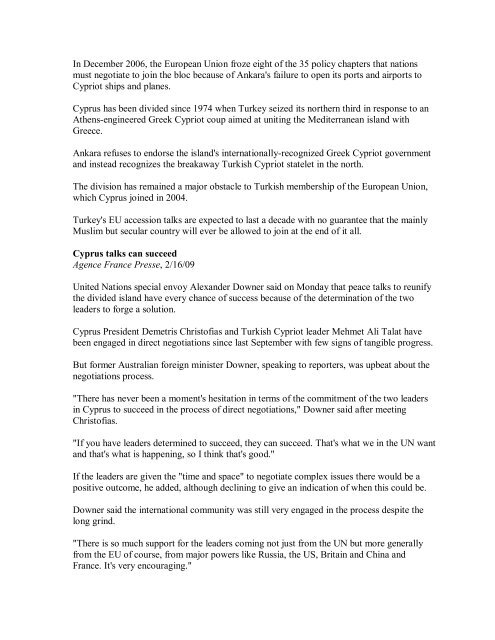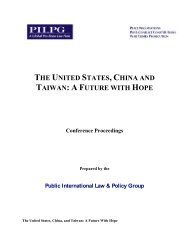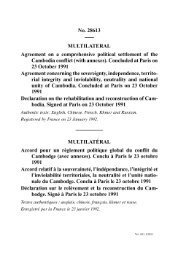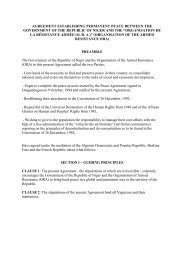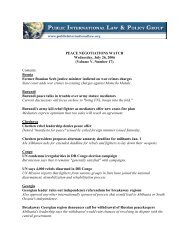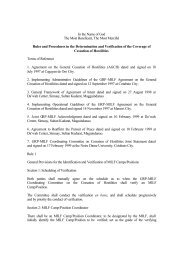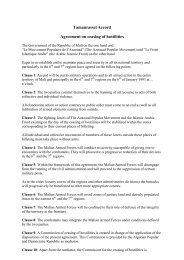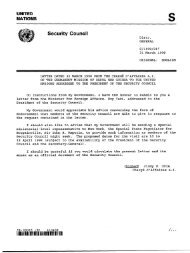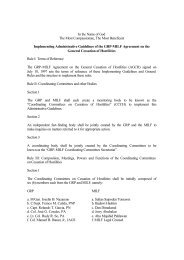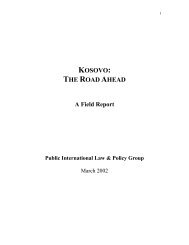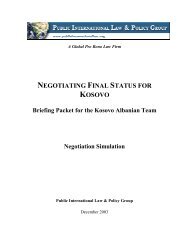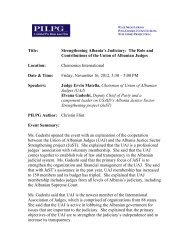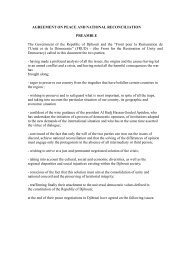Vol. 8 Issue 7 - Public International Law & Policy Group
Vol. 8 Issue 7 - Public International Law & Policy Group
Vol. 8 Issue 7 - Public International Law & Policy Group
You also want an ePaper? Increase the reach of your titles
YUMPU automatically turns print PDFs into web optimized ePapers that Google loves.
In December 2006, the European Union froze eight of the 35 policy chapters that nations<br />
must negotiate to join the bloc because of Ankara's failure to open its ports and airports to<br />
Cypriot ships and planes.<br />
Cyprus has been divided since 1974 when Turkey seized its northern third in response to an<br />
Athens-engineered Greek Cypriot coup aimed at uniting the Mediterranean island with<br />
Greece.<br />
Ankara refuses to endorse the island's internationally-recognized Greek Cypriot government<br />
and instead recognizes the breakaway Turkish Cypriot statelet in the north.<br />
The division has remained a major obstacle to Turkish membership of the European Union,<br />
which Cyprus joined in 2004.<br />
Turkey's EU accession talks are expected to last a decade with no guarantee that the mainly<br />
Muslim but secular country will ever be allowed to join at the end of it all.<br />
Cyprus talks can succeed<br />
Agence France Presse, 2/16/09<br />
United Nations special envoy Alexander Downer said on Monday that peace talks to reunify<br />
the divided island have every chance of success because of the determination of the two<br />
leaders to forge a solution.<br />
Cyprus President Demetris Christofias and Turkish Cypriot leader Mehmet Ali Talat have<br />
been engaged in direct negotiations since last September with few signs of tangible progress.<br />
But former Australian foreign minister Downer, speaking to reporters, was upbeat about the<br />
negotiations process.<br />
"There has never been a moment's hesitation in terms of the commitment of the two leaders<br />
in Cyprus to succeed in the process of direct negotiations," Downer said after meeting<br />
Christofias.<br />
"If you have leaders determined to succeed, they can succeed. That's what we in the UN want<br />
and that's what is happening, so I think that's good."<br />
If the leaders are given the "time and space" to negotiate complex issues there would be a<br />
positive outcome, he added, although declining to give an indication of when this could be.<br />
Downer said the international community was still very engaged in the process despite the<br />
long grind.<br />
"There is so much support for the leaders coming not just from the UN but more generally<br />
from the EU of course, from major powers like Russia, the US, Britain and China and<br />
France. It's very encouraging."


